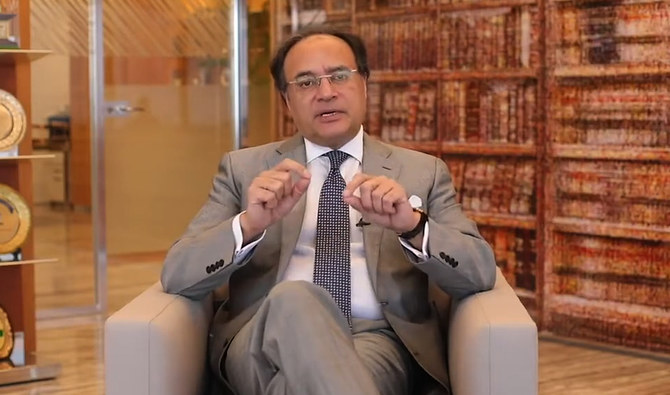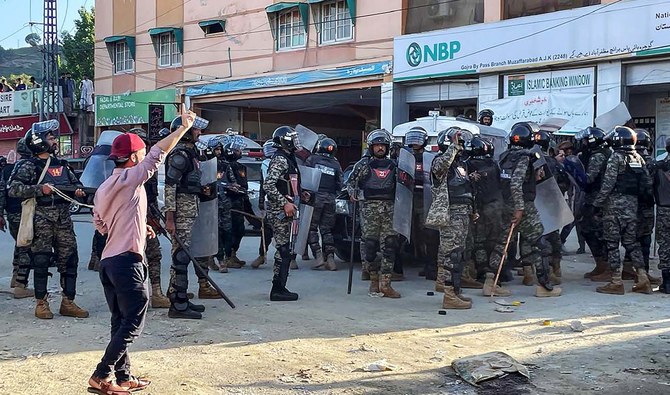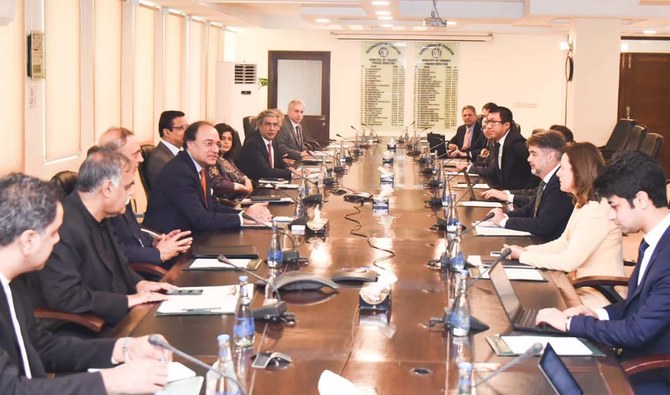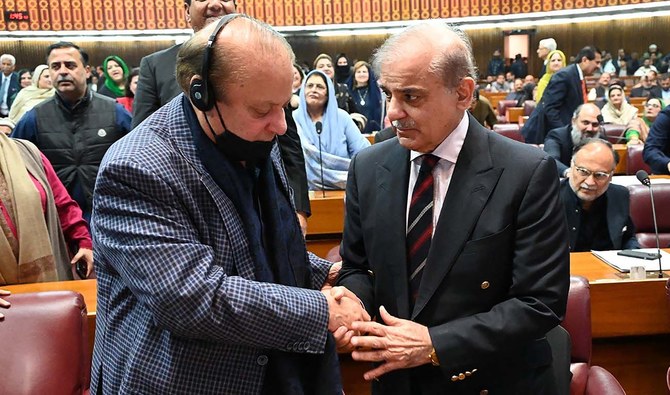ISLAMABAD: The chief executive officer of Pakistan’s largest bank, HBL, is likely to be tapped for a top position in the finance team of newly elected Prime Minister Shehbaz Sharif, two sources told Reuters, ahead of talks with the IMF for a fresh bailout deal.
Pakistan urgently needs a fresh IMF agreement to shore up its struggling $350 billion economy which is suffering from high inflation, low reserve and high external financing needs.
Muhammad Aurangzeb, currently the CEO of HBL, is likely to be appointed Special Assistant to the Prime Minister on Finance, two sources said — one in the finance ministry and the other with direct knowledge of discussions.
A final decision is yet to be taken. Sharif has to pick a cabinet after being sworn in on Monday — most importantly a finance team, with Pakistan’s current $3 billion, nine-month IMF program expiring next month.
Spokespeople for Sharif’s party and HBL did not immediately respond to requests for comment.
Local broadcaster Geo News also reported that Aurganzeb would get the post of finance minister, citing sources close to the prime minister, but the banker does not have a seat in parliament which is required by law to become a full minister.
It was not immediately clear if Aurangzeb, even as special assistant, would be the de facto finance tsar with Sharif or someone else holding the additional portfolio of finance minister.
Aurangzeb had also served as the CEO of JP Morgan’s Global Corporate Bank based in Asia, and has extensive experience working with global markets.
Besides the IMF deal, Pakistan also needs to attract foreign investment to bring in funds to shore up its low reserves, which are critical to meeting a large external financing needs, as well as kick starting its flagging economy.
After taking the oath, Sharif immediately met finance officials and advisers, directing them to open talks with the IMF for an Extended Fund Facility — a long tenure package which analysts say is mandatory to save the country from default.
Aurangzeb was a part of that meeting, a video of the gathering shared with journalists by the government’s information team showed.
Chief of Pakistan’s largest bank likely to be included in new finance team
https://arab.news/jhuck
Chief of Pakistan’s largest bank likely to be included in new finance team

- Pakistan urgently needs a fresh IMF deal to shore up its struggling economy, suffering from high inflation, low reserves and financing needs
- Muhammad Aurangzeb, currently CEO of HBL, is likely to be appointed Special Assistant to the Prime Minister on Finance, two sources say
Three killed in clashes with paramilitary Rangers amid Azad Kashmir protests

- Protesters have been calling for reduction in wheat, electricity prices in Himalayan valley through days-long demonstrations
- Earlier on Monday, PM approved $83 million wheat flour and electricity subsidy and Azad Kashmir announced new prices
ISLAMABAD: At least three people were killed and scores injured as protesters clashed with paramilitary Rangers troops in Azad Kashmir, officials said on Monday, despite Pakistan’s announcement of a $83 million subsidy to reduce wheat flour and electricity prices in the region.
The development comes amid days-long protests in the disputed Himalayan valley, which is administered by Pakistan, led by the Jammu Kashmir Joint Awami Action Committee (JAAC), which is demanding subsidized wheat flour and that electricity prices be set as per the hydropower generation cost in Azad Kashmir.
On Saturday, a policeman was killed in clashes between police and demonstrators as authorities blocked a rally from moving toward Azad Kashmir’s capital, Muzaffarabad, from the region’s Poonch and Kotli districts. Weekend talks between the JAAC core committee and AJK Chief Secretary Dawood Bareach in Rawalakot ended in a stalemate and a planned march by protesters to the capital resumed on Monday.
Azad Jammu and Kashmir (AJK) Prime Minister Anwar-ul-Haq said at a press conference on Monday the regional government had notified reduced prices of wheat flour and electricity after Pakistani Premier Shehbaz Sharif okayed Rs23 billion ($83 million) in subsidies.
“Despite the issuance of notifications to reduce electricity and wheat prices, along with addressing other demands, protesters attacked a Rangers convoy, leading to an exchange of gunfire that resulted in the death of three civilians and many injuries on both sides,” Abdul Majid Khan, a spokesperson of the AJK government, told Arab News.
“The deployment of Rangers is not uncommon and their [protesters] attack on the convoy was uncalled for as it occurred after the government had already accepted their demands,” he added.
“The situation is currently under control and we are trying to bring calm as the government will not allow mischievous elements to succeed.”
Amjad Ali Khan, a member of the JAAC core committee member, said the protesters had been contemplating calling off the protest after the price reduction announcements, but the situation had “completely changed” after the killings of the three demonstrators.
“At the moment, we are not clear about the exact number of injured as many are injured, while three deaths have been confirmed,” he told Arab News.
Amjad said protesters got agitated by the heavy deployment of the paramilitary Rangers and clashes resultantly erupted in different areas of Muzaffarabad.
“Although the actual issue for which demonstrations started [protesting] has been settled, this new development has changed everything and now we will decide our new course of action tomorrow (Tuesday),” he added.
The Himalayan territory of Kashmir has been divided between India and Pakistan since their independence from Britain in 1947, with both countries ruling part of the territory, but claiming it in full. The western portion of the larger Kashmir region is administered by Pakistan as a nominally self-governing entity while India rules the southern portion of the larger Kashmir region as a union territory.
While the Indian portion has faced an ongoing insurgency for decades and multiple armed attempts by the state to quell it, the Pakistani side has remained relatively calm through the decades, though it is also highly militarized.
SUBSIDY
Earlier on Monday, AJK PM Haq announced a reduction in the prices of wheat flour and electricity in the region, thanking Pakistan PM Shehbaz Sharif for approved a Rs23 billion ($83 million) subsidy to make it possible.
“He [Sharif] issued instructions and the things that had been pending for a long time with regard to subsidy, electricity prices, resources, have been provided to Azad Kashmir,” Haq said.
The new price of electricity in the region will be Rs3 per unit for 1-100 units, Rs5 per unit for 100-300 units and Rs6 per unit for those consuming above 300 units. Commercial unit price will be Rs10 for 1-300 units, and Rs15 for above 300 units, according to Haq. A 40kg bag of wheat flour, which was previously priced at Rs3,100, will now be sold for Rs2,000.
“This would cost more than Rs23 billion to the national exchequer,” Haq added, “which the [federal] government and the prime minister of Pakistan gladly accepted.”
IMF, Pakistani officials begin formal talks in Islamabad for fresh bailout program

- The South Asian country last month completed a short-term $3 billion IMF program that helped stave off a sovereign default
- While Islamabad expects a staff-level agreement by July, both sides have refrained from commenting on the size of the program
ISLAMABAD: A team of the International Monetary Fund (IMF) and Pakistani officials on Monday began formal talks in Islamabad for a fresh, longer-term bailout program for the cash-strapped South Asian country, the Pakistani finance ministry said.
The South Asian country, which has been facing low foreign exchange reserves, currency devaluation and high inflation, last month completed a short-term $3 billion IMF program that helped stave off a sovereign default, but the incumbent government of PM Shehbaz Sharif has stressed the need for a fresh, longer-term program.
While Islamabad has said it expects a staff-level agreement by July, both Pakistani and IMF officials have refrained from commenting on the size of the program. The South Asian country is expected to seek around $7-8 billion bailout from the global lender.
On Monday, the IMF team, led by Mission Chief Nathan Porter, met Pakistan Finance Minister Muhammad Aurangzeb, central bank governor, chairman of the Federal Board of Revenue and other officials to kickstart discussions on further engagement with the lender.
“The Finance Minister welcomed the IMF team and thanked them for the successful completion of the [$3 billion] Standby Arrangement (SBA),” the Pakistani finance ministry said in a statement.
“The Finance Minister apprised the IMF team of the improvement in the macro-economic indicators over the course of the SBA and underscored the government’s commitment to continue with and expand upon the reform agenda.”
Pakistan narrowly averted a default last summer and its $350 billion economy has slightly stabilized after the completion of the last IMF program, with inflation coming down to around 17 percent in April from a record high of 38 percent in May last year.
However, the South Asian country is still dealing with a high fiscal shortfall and while it has controlled its external account deficit through import control mechanisms, it has come at the expense of stagnating growth, which is expected to be around 2 percent this year, compared to negative growth last year.
Wall Street Bank Citi expects Pakistan to reach an agreement with the IMF of up to $8 billion program by end-July, and recommends going long on the country’s 2027 international bond.
“While longer-term challenges pertain, we see several positive catalysts supporting the Eurobonds,” Nikola Apostolov at Citi wrote in a note to clients.
“First, a larger and longer IMF EFF (Extended Fund Facility) program could be finalized by July – possibly a $7-8 billion 4-year program and secondly and a possible inflow of Saudi investments,” Apostolov said after a team from Citi visited Pakistan and met policymakers, including Finance Minister Muhammad Aurangzeb.
Citi said it expected Pakistan’s international 2027 bond to offer a sweet spot to investors with sufficient liquidity and large upside as risks of default dissipate further.
— With additional inputs from Reuters.
Pakistan PM steps down as ruling party president, Nawaz Sharif posed to take charge

- Nawaz, who founded the Pakistan Muslim League-Nawaz in 1993, stepped down as president in 2018
- Supreme Court had ruled individuals disqualified under Articles 62/63 of constitution couldn’t head party
Prime Minister Shehbaz Sharif has resigned as president of the ruling Pakistan Muslim League-Nawaz (PML-N), saying it was time for his elder brother and three-time former premier Nawaz Sharif to “resume his rightful place” as the party’s leader, the PML-N confirmed on Monday.
Nawaz, who founded the PML-N in 1993, stepped down as its president in 2018 after the Supreme Court (SC) ruled that an individual disqualified under Articles 62 and 63 of the constitution, which outline the rules for qualification and disqualification for parliamentarians, could not serve as the head of a political party.
Sharif was disqualified as prime minister by the Supreme Court in July 2017, which declared him “dishonest” for not disclosing a separate monthly income from a company owned by his son. The court also ordered the National Accountability Bureau (NAB) to open a criminal trial into the ownership of London flats and several other revelations about the ex-PM’s family wealth disclosed in the Panama Papers’ leaks.
A year later, following the investigations ordered by the court, Nawaz was sentenced to 10 years in prison for corrupt practices linked to his family’s purchase of the upscale London flat and subsequently to seven years in jail in a separate case for being unable to prove the source of income that had led to his ownership of a steel mill in Saudi Arabia. Nawaz has since been acquitted in both cases, which he always maintained were politically motivated.
Sharif, who is Nawaz’s younger brother, subsequently became president of the party but has always maintained it was a temporary arrangement until his brother was exonerated by the courts.
On Monday, PML-N information secretary and Senior Punjab Minister Marriyum Aurangzeb shared Sharif’s resignation on X.
“I am heartened by recent developments that have exonerated our leader with dignity, affirming his unblemished integrity and commitment to the service of our nation,” Sharif wrote.
“Therefore, it is with a deep sense of duty and reverence for our party’s principles that I tender my resignation as the president of PML-N,” he added, pledging to support the PML-N with “unwavering loyalty” under Nawaz. “The time has come for Mohammad Nawaz Sharif to resume his rightful place as the president of the PML-N.”
After being jailed in 2018, Nawaz flew to London in 2019 after a court allowed him to leave for medical treatment, on the condition he returned when fit. However, he went into exile and ran his party affairs from London, while former cricketer Imran Khan ruled as prime minister until April 2022, when he was ousted in a parliamentary vote of no confidence.
Nawaz’s younger brother, Shehbaz Sharif, subsequently became prime minister for 16 months ahead of general elections on Feb. 8 after which Sharif once again came to power in March and became premier, ruling Pakistan through a fragile coalition with smaller parties.
PIA set to resume Europe operations with flights to Paris in June-July, says CEO

- The ban was instituted after PIA air crash in May 2020 which was followed by a fake pilot license scandal
- EU’s Aviation Safety Agency says it is ‘not in a position to provide any information related to the status of PIA’
KARACHI: Pakistan International Airlines (PIA) would resume its operations in Europe with two weekly flights to Paris in June and July, the airline’s chief executive officer said on Monday, years after the national flag carrier was barred from operating flights to Europe.
PIA flights to Europe and the UK have been suspended since 2020 after the EU’s Aviation Safety Agency (EASA) revoked the national flag carrier’s authorization to fly to the bloc following a pilot license scandal that rocked the country.
The issue, which followed a plane crash in May 2020 that killed nearly a hundred people, had resulted in the grounding of 262 of Pakistan’s 860 pilots, including 141 of PIA’s 434.
“We hope we will commence our bi-weekly flights for Paris in the June or July timeframe. We are very hopeful about it,” said PIA CEO Muhammad Amir Hayat, while responding to questions during a Facebook Live.
“All our pre-operation formalities are complete, we just await final clearance, and as soon as we get it, we will start.”
Soon after the ban was imposed, Hayat said, PIA began compiling deliverables, systematically providing evidence to EASA, and telling the European agency the airline was safety-compliant.
“In March 2023, they conducted an online audit, and from my perspective, it was clear to them as they conducted the online audit that they would come for a physical audit, and they would be assured that we are at the level where they can confirm the audit,” Hayat said, adding the physical audit was conducted in November.
“In December, we received their confirmation that they accepted our deliverables. However, along with that, there are also some deliverables from the Civil Aviation Authority for which the CAA is in touch with them.”
For direct flights to the UK, Hayat said, an independent audit would have to be conducted post-Brexit.
“We have uploaded all the requirements on their portal. According to a careful estimate, after receiving clearance from EASA, the process should take two to three months,” he said. “We hope to achieve the goals of UK and European flights this year.”
Reached for confirmation, an EASA spokesperson told Arab News via email that the agency was “not in a position to provide any information related to the status of PIA.”
The spokesperson advised contacting PIA or the Pakistani CAA for information regarding any developments.
Pakistan is also set to privatize the national airline, which has been facing a financial crisis for the last several years, by June and July as part of the requirements set by the International Monetary Fund (IMF).
But no significant progress has been on that front made due to various reasons, including the suspension of the airline’s flights to Europe.
Pakistan to finalize ‘major agreements’ ahead of arrival of ‘higher’ Saudi delegation — commerce minister

- Pakistan has announced Saudi crown prince will visit this month but no dates have been confirmed by either country
- There have been flurry of high-level Saudi visits to Pakiatan in recent days as Islamabad pushes for foreign investments
KARACHI: Pakistan’s Commerce Minister Jam Kamal Khan said on Monday some “major agreements” will be finalized ahead of the arrival of a “higher” delegation from Saudi Arabia, after various Saudi and Pakistani firms developed an understanding during a recent visit by Saudi delegates to Pakistan.
Pakistan’s Deputy Prime Minister Ishaq Dar last week said a much-awaited visit of Saudi Arabia’s Crown Prince Mohammed bin Salman to Islamabad was “on the cards” and could materialize any time during May. But neither of the two sides confirmed any dates.
His statement followed a series of high-level engagements between Pakistan and Saudi Arabia, including the visits of Pakistan PM Shehbaz Sharif to the Kingdom and a visit of Saudi Foreign Minister Faisal bin Farhan to Islamabad.
This month, a high-level Saudi business delegation, led by the Kingdom’s Assistant Minister of Investment Ibrahim Al-Mubarak, visited Pakistan to explore investment opportunities in various sectors, including mineral, energy, agriculture and petroleum.
“More than 100 Pakistani companies participated in the meetings with Saudi counterparts and even today, the process of meetings continues while the outcome of G2G (government-to-government) meetings has been seen in a very positive way in different sectors,” Khan said at a press conference in Karachi.
“A higher delegation from Saudi Arabia will definitely come to Pakistan, so before that, we should make a final form of these things (agreements), so that in the final form of B2B (business-to-business), some major agreements are signed.”
Khan did not specify a date for the arrival of the Saudi delegation. Pakistan and Saudi Arabia have lately been working to increase bilateral trade and investment deals, with Crown Prince Mohammed bin Salman last month reaffirming the Kingdom’s commitment to expedite an investment package of $5 billion.
During the visit of the Saudi assistant investment minister this month, a number of agreements were signed and Pakistani companies have been asked to submit details of these agreements, according to the commerce minister.
The government has made various sectors available for facilitation, including agriculture, information technology (IT), energy and ports, and even, construction companies in Saudi Arabia have also shown interest in these sectors.
Along with that, Khan informed, progress was also being made on a free trade agreement with the Gulf countries.
He said a memorandum of understanding (MoU) had been received from Alibaba Group, a Chinese multinational company specializing in e-commerce, retail, Internet and technology, for the improvement of connectivity with the Trade Development Authority of Pakistan (TDAP) to penetrate rural and urban areas of Pakistan.
“They have put their stake in that MoU and if it gets vetted and clarity comes, then the senior-most [official] in Alibaba will come to Pakistan and sign it, which will be a big thing,” the minister said.
Asked about the ongoing wheat crisis, Khan said no one could be held responsible prior to the completion of a probe.
Farmers in Pakistan’s Punjab province, which produces most of the wheat crop, are demanding the government stop wheat imports that have flooded the market at a time when they expect bumper crop. They say the import of wheat in the second half of 2023 and the first three months of this year has resulted in excess amounts of the commodity in the country, leading to reduced prices.
The South Asian country is trying to ascertain the factor that led to the import of wheat during the tenure of the interim government of caretaker prime minister, Anwar-ul-Haq Kakar, despite expectations of a bumper crop.
“It is premature to say who is responsible or due to whose negligence the current situation has arisen,” Khan said.
Zubair Motiwala, the TDAP chief executive, said the country’s food and agriculture exports had witnessed a substantial increase, which would cross $7 billion from $3.5 billion.
The major exports included rice, maize and sesame seeds, while there was a negative trend in the export of textiles, he said.
For the first time in the country, Motiwala shared, a policy was being introduced under which action could be taken against exporters for exporting substandard goods and companies could also be blacklisted.









